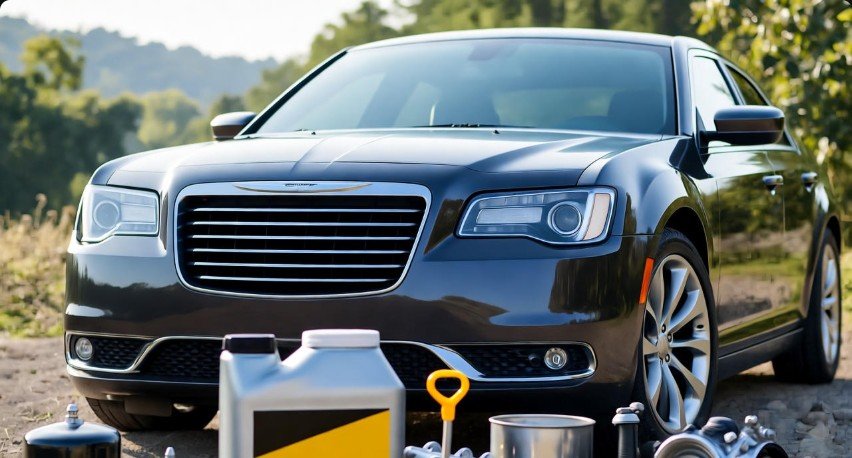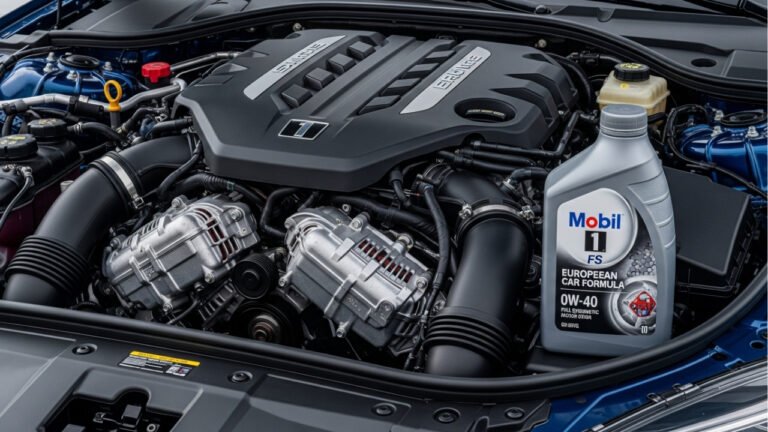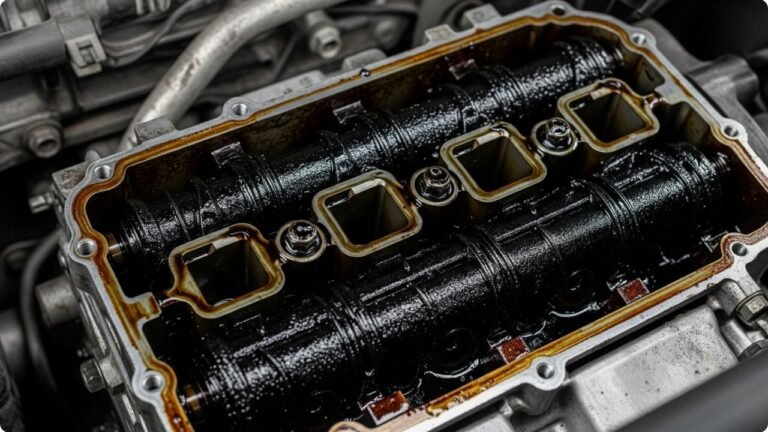What Kind of Oil Does a Chrysler 300 Take? Here’s the Ultimate Guide

People love the Chrysler 300 for its bold look and smooth ride. When you drive one, you feel like the road opens for you. But even a strong car needs the right care. One of the most important things is the oil you use. Many owners ask the same question at some point: What kind of oil does a Chrysler 300 take? It seems simple, but the answer has layers. Your engine type matters. The model year matters too. These things guide you to the right oil. When you make the right choice, the engine stays strong for years. When you don’t, the engine can strain. You may even face repair costs later.
In this guide, I break it down in a clean and simple way. I also share insights from real experiences. I want this to feel like advice from a friend, not a technical sheet. Think of this as a map. It guides you so your Chrysler 300 runs smooth and calm, like a steady river.
In This Article
- 1 Why Oil Matters More Than Most People Think
- 2 Understanding Oil Needs by Engine and Model Year
- 3 Why Synthetic Oil Is the Best Choice for Your Chrysler 300
- 4 How Viscosity Affects Your Chrysler 300
- 5 API Certification and Why It Matters
- 6 How to Choose the Right Oil Brand for Your Chrysler 300
- 7 Signs You Are Using the Wrong Oil
- 8 Bullet Points: Quick Tips to Remember
- 9 How Often Should You Change the Oil in a Chrysler 300?
- 10 The Benefits of Following Manufacturer Recommendations
- 11 Extreme Conditions and Oil Considerations
- 12 Top Tips for Checking and Maintaining Oil Levels
- 13 Common Myths About Chrysler 300 Oil
- 14 How Oil Choice Affects Fuel Economy and Engine Life
- 15 DIY vs Professional Oil Changes
- 16 FAQs: Your Questions About Chrysler 300 Oil Answered
- 17 Conclusion
Why Oil Matters More Than Most People Think
Oil is like the blood of your engine. It flows, cools, and shields every moving part. When the oil is right, the engine breathes easy. When the oil is wrong, the engine fights heat and friction. I have seen engines fail early because owners skipped proper oil care. It often starts small. A rough idle. A loud sound after a cold start. Small signs grow.
So when people ask What kind of oil does a Chrysler 300 take, I tell them this: the right oil is not a luxury. It is protection. Good oil keeps the inside of the engine clean. It reduces sludge. It stands strong in hot or cold weather. Chrysler recommends synthetic oil for most models for these reasons. Synthetic oil lasts long. It handles heat well. It protects better in extreme weather.
Think of conventional oil as an old coat. It works, but not in a storm. Think of synthetic oil as a warm, strong jacket. It works everywhere. The Chrysler 300 engine loves that kind of support.
Understanding Oil Needs by Engine and Model Year
Your Chrysler 300 may look like someone else’s, but the engine may not be the same. Chrysler released many engine options over the years. Each engine has its own oil needs. So the best way to answer What kind of oil does a Chrysler 300 take is to know your specific model.
Here is a simple table based on engine type and year. This helps you see the general rule fast.
| Chrysler 300 Model Year | Engine Type | Recommended Oil |
|---|---|---|
| 2011 – 2019 | V6 | 5W-30 Synthetic |
| 2011 – 2021 | V8 | 0W-20 Synthetic |
| 2022 (V6) | V6 | 5W-20 Synthetic |
| 2022 (V8) | V8 | 0W-20 Synthetic |
These are common recommendations. Your owner manual gives the final call. But this list helps you know the general flow. Chrysler prefers synthetic oil because it stays strong in all conditions. I have seen these engines handle hot highways and cold mornings without stress when the right oil is used.
Why Synthetic Oil Is the Best Choice for Your Chrysler 300
When people hear “synthetic oil,” they think it is something complicated or fancy. But synthetic oil is simple. It is clean oil made in a lab. It is not full of impurities like some conventional oil. That is why Chrysler relies on it.
Synthetic oil helps your Chrysler 300 in many ways. It flows smooth in cold weather. It stays thick enough in hot weather. It stops sludge from forming. It protects the engine even when you drive long hours. Think of synthetic oil as a shield. It stands between metal parts and heat.
So when you wonder What kind of oil does a Chrysler 300 take, remember this: synthetic oil is not a trend. It is a necessity for most modern Chrysler engines. The engine runs better. The fuel economy improves. The engine life gets longer. That means fewer headaches and fewer costs over time.
How Viscosity Affects Your Chrysler 300
Viscosity means how thick the oil is. It tells you how the oil behaves in heat and cold. If the oil is too thick, it moves slow. If it is too thin, it loses protection. Your Chrysler 300 needs the right balance.
Manufacturers use numbers like 5W-20 or 0W-20 to guide you. These numbers tell you how the oil flows when cold and hot. For example, 0W-20 flows very well in cold weather but stays strong when hot. This works well for engines that need fast flow.
When people ask What kind of oil does a Chrysler 300 take, I explain viscosity like water and honey. Water flows fast. Honey flows slow. The engine needs something in between, depending on the model. Chrysler knows the perfect match for each engine. So checking the manual is the best step you can take.
API Certification and Why It Matters
Oil is not just oil. There are standards. You will see a small seal on the bottle. That is the API certification. It means the oil meets quality rules. It is safe for your engine.
If you pick oil without certification, you may risk engine wear. Many drivers ignore this small detail. But it matters. Chrysler engines respond best to oils that pass these tests.
So when answering What kind of oil does a Chrysler 300 take, keep this in mind. Look for the API donut symbol. It tells you the oil passed tests for stability, wear protection, and heat resistance. This gives you peace of mind.
How to Choose the Right Oil Brand for Your Chrysler 300
Many brands sell synthetic oil. Not all are equal. Good brands test their oil many times. They use clean formulas. They protect your engine in real conditions.
When people ask me which brand to pick, I give simple advice. Choose a brand that has a long track record. Choose one that meets Chrysler’s standards. Choose one that feels right for your driving style.
Some drivers push their Chrysler 300 hard. Some drive calm. Some deal with hot climates. Some deal with cold weather. Your driving style can guide your choice.
But the big question always stays the same: What kind of oil does a Chrysler 300 take? And the answer stays steady: synthetic oil within Chrysler’s recommended viscosity range is your best and safest option.
Signs You Are Using the Wrong Oil
Sometimes drivers use the wrong oil without knowing. The car will send signs. The engine may sound loud on cold starts. You may feel slow acceleration. You may see dark smoke from the exhaust. The engine may shake more than normal.
These signs point to stress inside the engine. The oil may be too thick. It may be too thin. It may have poor additives.
So when you think again about What kind of oil does a Chrysler 300 take, remember that the wrong choice shows itself fast. If you notice new noises after an oil change, check the oil type. A quick fix can save you from long-term damage.
Bullet Points: Quick Tips to Remember
Here are some simple points that many Chrysler 300 owners forget:
-
Use synthetic oil for best engine life.
-
Check the owner manual before you buy oil.
-
Do not mix different viscosities.
-
Look for API-certified oil.
-
Change oil on time, even if it still looks clean.
-
Use the oil weight Chrysler recommends.
-
Listen for new engine sounds after every oil change.
These points guide you. They also help you avoid mistakes that many drivers make when choosing oil.
How Often Should You Change the Oil in a Chrysler 300?
Changing oil on time is as important as picking the right one. Even the best synthetic oil loses efficiency over time. For a Chrysler 300, the typical recommendation is every 7,500 miles or every six months—whichever comes first. Some drivers push longer intervals, thinking synthetic oil can last forever, but that is risky. Heat, driving habits, and climate can break down oil faster than expected.
I always tell friends: treat oil changes as engine insurance. Even if your engine feels fine, oil ages silently. Dark oil, unusual smells, or rough idling can be early warning signs. By sticking to a proper schedule, your Chrysler 300’s engine stays smooth and reliable, avoiding costly repairs. A consistent oil routine also helps preserve fuel efficiency and reduces wear on other components like the timing chain and valves.
The Benefits of Following Manufacturer Recommendations
You might think, “Why not use any high-grade oil?” Here’s the truth: Chrysler engineers test engines with specific oil types. Deviating from recommendations can reduce performance or even void warranties. Using the wrong viscosity or low-quality oil may lead to higher engine friction, overheating, or sludge buildup.
Following Chrysler’s guidelines ensures your engine operates as designed. Beyond performance, it protects resale value. Buyers notice maintenance records, and a well-cared-for engine with documented oil changes stands out. When you think about What kind of oil does a Chrysler 300 take, remember it’s about more than lubrication—it’s about long-term reliability and peace of mind.
Extreme Conditions and Oil Considerations
If you live in extreme climates, your Chrysler 300’s oil needs extra attention. Very cold temperatures require oil that flows easily at startup. Very hot temperatures need oil that resists breaking down under heat. Luckily, Chrysler’s synthetic recommendations like 0W-20 or 5W-30 cover most conditions.
However, if you frequently tow heavy loads or drive long stretches in stop-and-go traffic, consider premium synthetic oils that provide enhanced protection. This reduces engine stress and ensures consistent performance. I’ve seen owners who switch to higher-quality synthetic oils notice smoother acceleration and quieter operation, especially in summer heat or during winter cold starts.
Top Tips for Checking and Maintaining Oil Levels
Knowing the oil type is only part of the equation. Checking levels and condition is crucial. Here’s a simple routine:
-
Check the oil every month or before long trips.
-
Use the dipstick, wiping it clean first, then re-inserting to get an accurate reading.
-
Look at the color: golden or amber oil is good; very dark or gritty oil signals it’s time for a change.
-
Never top up with a different viscosity unless you plan to do a full oil change.
Regularly checking oil allows you to catch leaks, low levels, or breakdowns early. It’s a small habit that can prevent engine damage, extending the life of your Chrysler 300.
Common Myths About Chrysler 300 Oil
There’s a lot of confusion about oil. Let’s bust some myths:
-
Myth 1: “Synthetic oil lasts forever.”
Reality: Synthetic lasts longer than conventional, but it still ages. Follow mileage and time guidelines. -
Myth 2: “You can use any viscosity if it’s synthetic.”
Reality: Viscosity matters. Using the wrong weight reduces protection and efficiency. -
Myth 3: “Expensive oil is always better.”
Reality: Price doesn’t always equal quality. Stick to API-certified, manufacturer-approved oil.
Knowing the truth behind these myths helps you make smart decisions and keeps your engine protected.
How Oil Choice Affects Fuel Economy and Engine Life
The right oil doesn’t just protect—it saves money too. Proper viscosity reduces friction. Reduced friction improves fuel efficiency, especially during city driving. It also prevents premature wear on pistons, bearings, and valves. Over time, engines using recommended synthetic oil have smoother starts, quieter operation, and fewer repairs.
When people ask What kind of oil does a Chrysler 300 take, they often overlook fuel economy benefits. Using the right oil can save hundreds in fuel and maintenance over a few years. That’s why this isn’t just about oil—it’s about a smarter, more cost-effective ownership experience.
DIY vs Professional Oil Changes
Some owners enjoy DIY oil changes. It’s doable if you have tools, space, and knowledge. You can pick exactly the oil you prefer, ensure proper disposal, and save a small service fee.
However, professional oil changes have perks. Mechanics often inspect other parts during the process, like belts, filters, and hoses. They catch small issues before they become major problems. If you’re unsure which oil is correct, a Chrysler dealership or trusted mechanic ensures proper selection, confirming What kind of oil does a Chrysler 300 take without guesswork.
FAQs: Your Questions About Chrysler 300 Oil Answered
1. What kind of oil does a Chrysler 300 take?
The Chrysler 300 takes synthetic oil, typically 5W-20, 5W-30, or 0W-20 depending on engine type and model year. Always check your owner manual for exact specifications.
2. Can I use conventional oil instead of synthetic?
Yes, but it’s not recommended. Synthetic oil offers better protection, longer intervals between changes, and improved performance.
3. How often should I change oil in my Chrysler 300?
Every 7,500 miles or every six months, whichever comes first. Driving conditions may require more frequent changes.
4. Does synthetic oil improve engine lifespan?
Absolutely. It reduces friction, prevents sludge, and maintains engine performance, extending the life of your Chrysler 300.
5. Is oil weight important?
Yes. Using the wrong viscosity (like 10W-40 instead of 0W-20) can reduce protection, affect fuel efficiency, and create long-term engine stress.
6. Can I switch brands of synthetic oil?
Yes, but ensure the new oil meets Chrysler specifications and has the proper API certification. Avoid mixing drastically different formulas.
7. What are signs I’m using the wrong oil?
Rough idling, engine noise, dark smoke, or higher fuel consumption are common signs that oil may not be suitable.
8. Does high mileage oil work for Chrysler 300?
High-mileage synthetic oil can be beneficial if your vehicle has over 75,000 miles, as it contains additives to protect older engines and reduce leaks.
Conclusion
Choosing the right oil for your Chrysler 300 isn’t complicated, but it’s critical. Using the right synthetic oil, following the proper viscosity, and checking the API certification ensures your engine runs smooth and lasts longer. Regular maintenance and oil changes protect your investment, improve fuel efficiency, and prevent costly repairs.
Remember, oil is the lifeblood of your engine. Treat it with care, follow manufacturer recommendations, and your Chrysler 300 will reward you with years of reliable, confident driving. Asking What kind of oil does a Chrysler 300 take is more than a question—it’s the first step toward keeping your vehicle performing at its absolute best.






